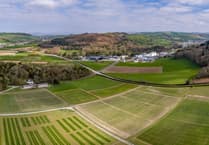A new hub dedicated to unlocking the potential of industrial hemp has been launched at Aberystwyth University's AberInnovation Campus.
The Industrial Hemp Innovations Hub will span key sectors — from textiles and construction to biofuels, food, medical applications, animal products and bioplastics — bringing together academics, global innovation models, and industry collaborators.
There is growing demand for industrial hemp with the global market projected to be worth $38 billion by 2035.
The crop is already used in construction as an alternative to concrete and in insulation, as well as in lightweight automotive components.
In textiles, hemp fibre is increasingly replacing cotton as a sustainable alternative, while in the food sector, hemp seeds and oil are gaining popularity for their nutritional benefits.
The development of industrial hemp in the UK faces challenges such as licensing restrictions, underdeveloped supply chains, and limited agronomic expertise.
Continued research into hemp’s potential, especially in UK climates, and further development of processing facilities are seen as crucial for the industry’s success.
The new Hub will work closely with the hemp industry and connected sectors to accelerate progress on the UN Sustainable Development Goals.
It will prioritise the agricultural sector’s role and promote diversification, carbon sequestration, soil regeneration, and rural resilience in way that supports farmers’ incomes.
Dr Ana Winters from IBERS at Aberystwyth University said: “We’re excited about the launch of the new hub here.
“We have long-established expertise with this crop and we welcome the opportunity to help spread the benefits to a wider audience.
“This represents the prospect of promoting a highly sustainable and versatile crop for the future.
“As well as the cosmetic, food and pharmaceutical uses, hemp has many industrial applications and could significantly reduce the need for expensive imports.
“The industrial hemp industry presents significant opportunities for green jobs, rural economic growth, and sustainable farming practices.”





Comments
This article has no comments yet. Be the first to leave a comment.